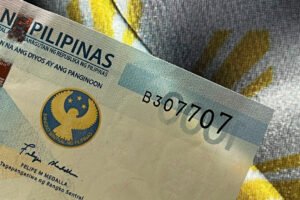THE NATIONAL Government’s (NG) debt service bill fell in April amid a drop in amortization payments, the Bureau of the Treasury (BTr) said.
Data from the BTr showed that debt repayments declined by 21% to P161.695 billion in April from P204.763 billion in the same month a year ago.
Month on month, the debt service bill plunged by 69.7% from P533.523 billion in March.
More than half (58.3%) of debt servicing during the month went to amortization.
Principal payments in April dropped by 40.6% to P94.199 billion from P158.51 billion in the same month a year ago.
Domestic debt payments slumped by 64.2% to P55.097 billion in April from P153.959 billion a year ago.
On the other hand, amortization on foreign obligations shot up (759.2%) to P39.102 billion from P4.551 billion.
Meanwhile, interest payments stood at P67.496 billion in April, 45.9% higher than P46.253 billion in the same month in 2023.
Broken down, interest on local debt jumped by 67.3% to P46.427 billion in April from P27.75 billion a year ago.
This consisted of P38.437 billion in fixed-rate Treasury bonds, P3.575 billion in retail Treasury bonds, and P2.703 billion in Treasury bills.
Interest paid on foreign debt went up by 13.9% to P21.069 billion in April from P18.503 billion a year ago.
FOUR-MONTH DEBT SERVICEMeanwhile, the NG’s debt service bill rose by 49% to P1.15 trillion in the first four months from P770.479 billion in the same period a year ago.
Payments for amortization climbed by 52.4% to P887.243 billion as of end-April from P582.249 billion a year ago.
Principal payments on domestic debt were recorded at P754.77 billion, while those on external debt stood at P132.473 billion.
Meanwhile, interest payments rose by 38.4% to P260.488 billion in the January-April period from P188.23 billion.
Broken down, interest paid on domestic debt reached P185.305 billion, while interest payments for external debt amounted to P75.183 billion.
Rizal Commercial Banking Corp. Chief Economist Michael L. Ricafort said that the NG debt service bill in April declined due to lower debt maturities paid for both principal and interest payments.
Debt payments fell despite elevated interest rates that drove up borrowing costs as well as a weaker peso that increased the peso equivalent of foreign debt, he added.
In May, the Monetary Board kept its key policy rate steady at a 17-year high of 6.5% for a fifth straight meeting.
The central bank has raised borrowing costs by a cumulative 450 basis points (bps) from May 2022 to October 2023.
On April 16, the peso fell to the P57-per-dollar level for the first time since November 2022. This was also its worst close in 17 months at the time.
Separate data from the BTr showed that the NG’s outstanding debt rose by 0.61% to P15.02 trillion as of end-April from a month earlier, mainly due to peso depreciation
As of the first quarter, the debt-to-gross domestic product (GDP) ratio stood at 60.2%.
The government set its debt-to-GDP ratio target at 60.3% this year. It is aiming to bring this down further to 55.9% by 2028. — Luisa Maria Jacinta C. Jocson
